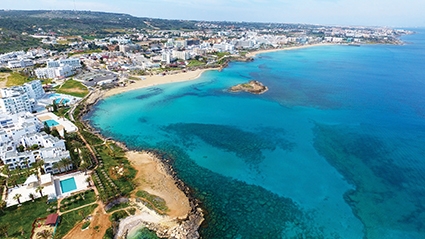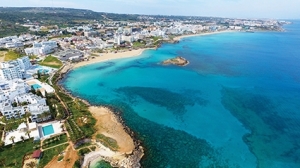The Cyprus Case: a Helpful Path towards Georgian Reunification?
Recent progress towards the reunification of Cyprus has put the island in the spotlight, and may provide a reliable recipe to defeat the cancer of separatism and secession. This recipe is becoming even more attractive in light of the deepening of existing territorial disputes and the rapid emergence of new ones. The Georgian government has paid (or at any rate should be paying) closer attention to the ups and downs of the Cypriot case, since, notwithstanding continuous efforts at various levels, the question of Georgia's territorial integrity remains at an impasse, offering little prospect for hope.
What lessons can we draw from efforts to reunite the divided and occupied island of Cyprus? Does Georgia's most acute problem resemble what Cyprus has undergone to date and is currently trying to overcome? Both cases bear striking resemblances and fundamental differences, but let us begin with an overview of the events which took place on the ‘Island of Aphrodite’ in order to better understand the drama which unfolded in Georgia in the early 1990s and its ever-present consequences.
Cyprus in the 1960s and ’70s
Tensions between the Turkish and Greek communities erupted almost immediately after Cyprus gained its independence from the United Kingdom in 1960. In reaction to ethnic clashes, Greece sent troops to the island and Turkey responded with airstrikes. In turn, the United Nations created the so-called ‘Green Line’ and deployed peacekeepers to maintain a buffer zone between the two sides in sectors of Nicosia. A relative stability lasted until 1967, when the ‘Colonels’ seized power in Greece and attempted to escalate the conflict. It is worth noting that the military junta’s policy of enosis (uniting Cyprus with Greece) was at odds with the course adopted by the Cypriot President, Archbishop Makarios III, who was eventually overthrown and fled to Britain. Turkey once again responded with great military force, and deployed troops to protect the Turkish Cypriot community. The unity of Cyprus was now effectively broken: the island was partitioned in 1974 between Turkish Cypriots to the north (effectively expanding their control to 36% of the island) and Greek Cypriots to the south. Although the coup in Athens collapsed quickly and a series of diplomatic efforts sought to restore the status quo, the island’s partition and the occupation of its northern part were maintained and indeed continue to this day. As a result of this conflict, nearly 160,000 Greek Cypriots fled to the south and around 50,000 Turkish Cypriots moved north to the so-called ‘Turkish Republic of Northern Cyprus’, whose independence only Turkey recognizes.
Parallels and differences
As this brief summary of the Cypriot question shows, the crisis has unfolded through a series of interconnected stages. This has also been the case in Georgia, and both conflicts were greatly escalated by the military intervention of external state actors. And yet the Cypriot and Georgian cases are clearly different, since on Cyprus the "patron states" of both communities, Greece and Turkey, openly intervened to protect their fellow countrymen, whom they saw as an ‘extension’ of their nation, culture and heritage. This is very different from the Georgian scenario, as there was no Russian community in the disputed territories at the time of Moscow’s open aggression. Instead, the Kremlin discreetly created a casus belli via the ‘passportization’ of the Abkhaz and Ossetian populations (by which the Russian authorities have induced people, usually the holders of former Soviet passports, to apply for Russian citizenship), thus enabling it to claim that its intervention was purely ‘humanitarian’. This original ‘humanitarian’ excuse—which in fact resulted in deeper ethnic cleansing and in the near-total exodus of Georgians from the disputed areas—was soon forgotten, and a new type of ‘Russian enosis’ through the ‘creeping annexation’ and progressive absorption of both territories is currently in full swing. But these slight historical parallels between the Cypriot and Georgian cases essentially end here, and in reality evolve into a series of differences.
‘Advantage Cyprus’
By virtue of its insularity, Cyprus has always been spared the problem of sharing land borders with any of the conflict’s ‘patron states’, notably Turkey. This absence of physical frontiers greatly alleviated the pressure the island came under from its neighbours, whereas their existence in Georgia’s case contributed decisively to the escalation of the conflict—but neighbourhood is obviously not the sole factor which renders the unification of Cyprus more feasible.
More importantly, Cyprus is a member of the EU; this makes a huge difference, and increases the chances of ultimately being able to resolve the Cypriot conflict. The possibility of becoming an EU citizen is a great incentive to those among the island’s Turkish community who wish for reconciliation and reunification. The legal and economic benefits of EU membership are crucial to the likely prospect of Cypriot unification, whereas the promise of visa-free access to the Schengen area for holders of Georgian passports is not as attractive.
Besides, Cyprus’s relatively peaceful process of reunification has led to the wider international engagement of impartial actors over the past few decades, introducing a preventive mechanism capable of negating the interference of patron states. In addition, the physical presence of a dedicated UN peacekeeping force in the buffer zone effectively prevents sporadic skirmishes between the two communities. These are without doubt precisely what the Georgian case so badly needs, and their absence forces us to go around in endless circles with no breakthrough in sight.
Overall, security issues include not only those commonly attributable to peacekeeping, but also others linked to post-conflict resolution. Negotiating a supranational security arrangement leading to the withdrawal of Turkish troops from Northern Cyprus would certainly accelerate the process of reconciliation and reunification. The fact that both Greece and Turkey are members of NATO gives added weight to the Cypriot case, as their membership provides a number of incentives (admittedly somewhat bleak in practice) to talk and come to an agreement under an umbrella of collective security. It is interesting to note that the NATO implications also entail inviting Cyprus to join the Alliance whilst preserving Turkish military forces on the island but under the NATO flag. The presence of Russian troops in Georgia’s breakaway regions, however, poses a much larger problem, since Russia refuses to progressively adapt its own reading of the conflict to that of the international community and international law. But Georgia is not alone in having to play a ‘game without rules’ against Moscow: there are unfortunately other examples to which the world’s democracies have yet to react effectively. It should be noted, en passant, that Russia is surreptitiously trying to position itself as a patron state and to bring pressure to bear upon the island’s Christian Orthodox community.
A key element inherent to conflict resolution in countries populated by several ethnic groups is agreeing on a form of fair governance and a well-balanced separation of powers. Coming to such an agreement is important for both legal and political reasons, as it enables actors to avoid becoming pawns in another’s game. Existing plans for a unified Cyprus with a federal (quasi-cantonal) system of government may well resonate not only with the national unity agenda, but also with cultural heritage preservation and the property rights of Greek and Turkish populations in various parts of the island. The latter question is a highly contentious point considering the ca. 160,000 Turkish nationals to have settled on the island since 1974 and the ca. 200,000 Greek Cypriots who lost their homes in violation of their property rights.
A side-effect of bringing about reconciliation in Cyprus is the plan to explore for oil and gas in the Mediterranean Sea, and in this respect the Georgian case yet again largely falls behind: plans for Anaklia may not be considered sufficient grounds for ‘infrastructure diplomacy’, and clearly something more would be needed to appeal to non-Georgian communities in the conflict zones.
Reinvigorating the Georgian case
Enough time has passed since the ‘hot’ phase of the conflict in Abkhazia and the war in South Ossetia was several years ago, but the Georgian government still has no clear and detailed strategy for its relationship with the Abkhaz and Ossetians. The declarations of ‘brotherhood and sisterhood’ various Georgian officials have made at different levels are not enough, and in the long run fall far short of what is needed to steer the country through the standoff phase of both conflicts. More importantly, a plan—a Georgian Unification Plan—for post-conflict arrangements needs to be formulated which consider matters such as security mechanisms in both regions, forms of government, property rights, citizenship, education, cultural heritage, etc. A Georgian Unification Plan such as this would certainly not be formulated in order to immediately be placed on the negotiating table; instead, its main purpose would be to serve as a detailed and concrete explanation of how we, the Georgians, see the future of our common state with the Abkhaz and Ossetians. Moreover, the plan would also have to take into account the special economic advantages which certain states on the periphery of the conflict zones have already gained within them, as ignoring these interests would render the plan unrealistic and impossible to implement. Let us be honest: ‘geo-economics’ exist in parallel with geopolitics.
In fact, such a plan may well be flexible, changing to the rhythm of regional and global geopolitics, but we need it to be worked out already.
As an ancillary to the process of drafting this plan—our own ‘white paper’, if you will—the law on occupied territories could be revisited. By opening the gates to businesses from friendly states, we could permit the free and unrestricted movement of goods and capital, and so reduce the ‘encapsulation’ of both regions by the aggressor state, raise the living standards of the Georgian community, and eventually help to create a progressive platform for future direct talks.
The Road Ahead
Georgia’s current policy of ‘non-recognition’ is good but not enough, as it does nothing to resolve the conflicts and merely maintains the matter frozen. Continuing to see ourselves as the victim is also no help since we, the Georgians, are expected to provide real solutions. The blame game must stop: it serves no real purpose, whereas taking the process away from the ‘hijacker’ and into our own hands would add real leverage to the country’s reunification.
Finally, the ability to resolve conflicts also relies heavily upon moral authority. This appeals to us, Georgians, as a nation striving to run a multinational state successfully and fairly; applying the same high standards when dealing with matters responsibly; not only pointing out the faults and failures of others, but also fully recognizing our own. This is, admittedly, a long-term process during which we will all end up as either winners or losers. Let us hope for the former.
Victor Kipiani












